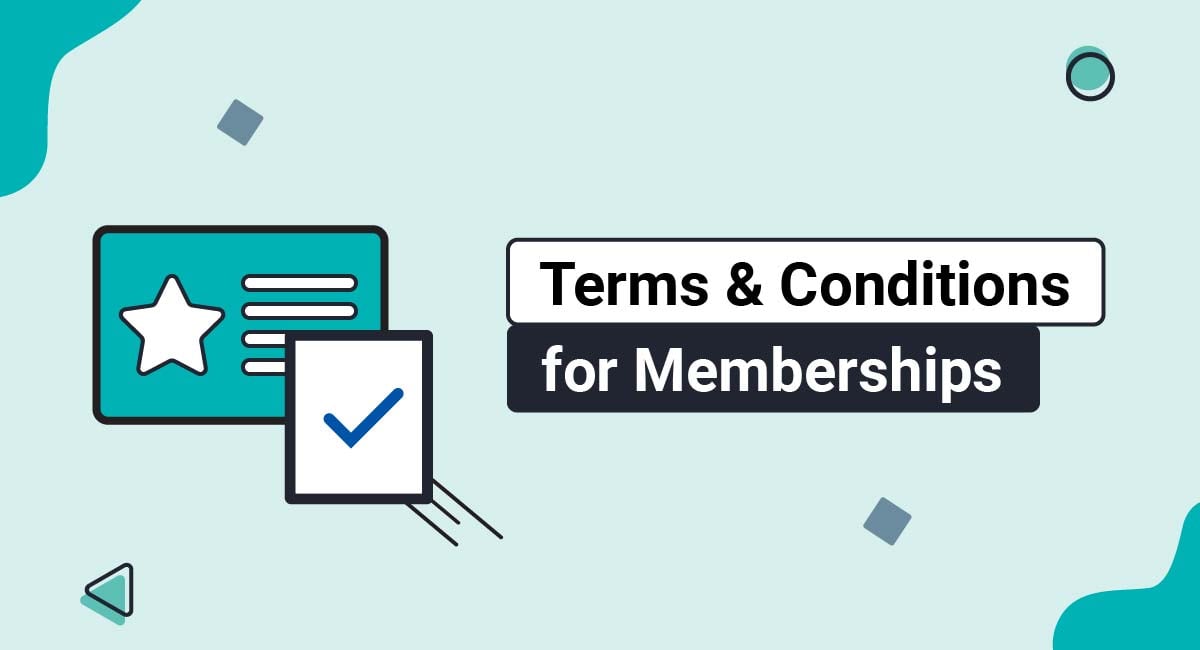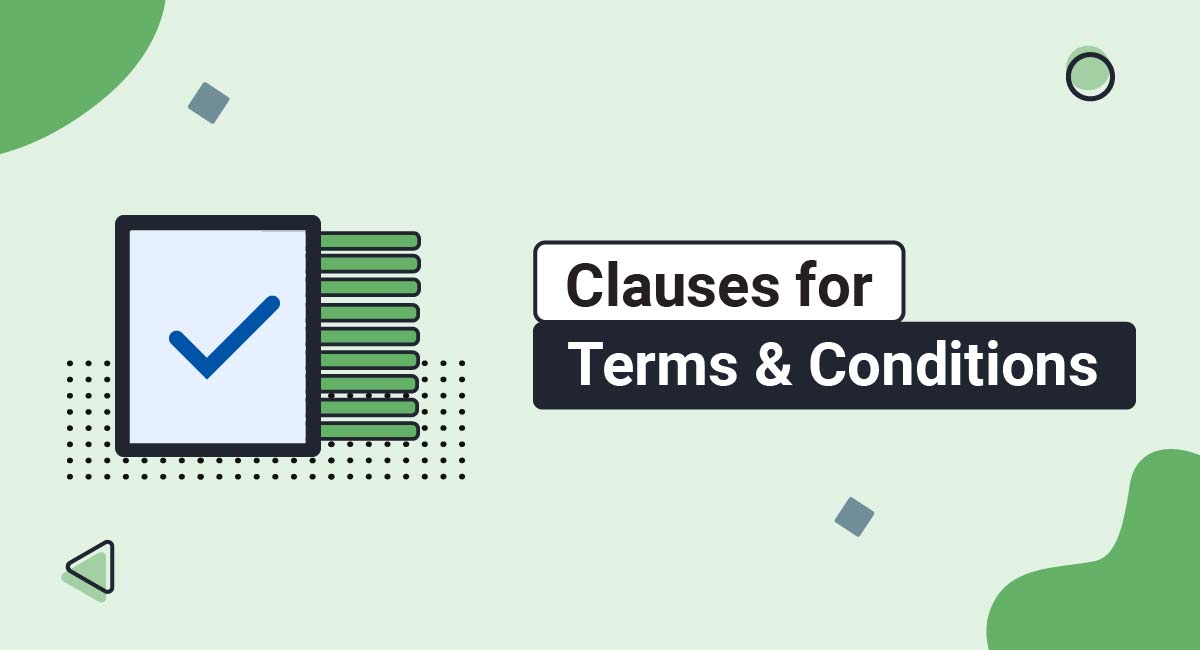When you create a membership website, one of the most important things you can do to protect your business and your members is to have a Terms and Conditions agreement (T&C) in place. This agreement lays out the rules and regulations for your website's operation and what members can expect from their experience.
In this article, we will explain why it is essential to have a Terms and Conditions agreement for your membership website and what you should include in it when creating your own.
Our Terms and Conditions Generator makes it easy to create a Terms and Conditions agreement for your business. Just follow these steps:
-
At Step 1, select the Website option or the App option or both.
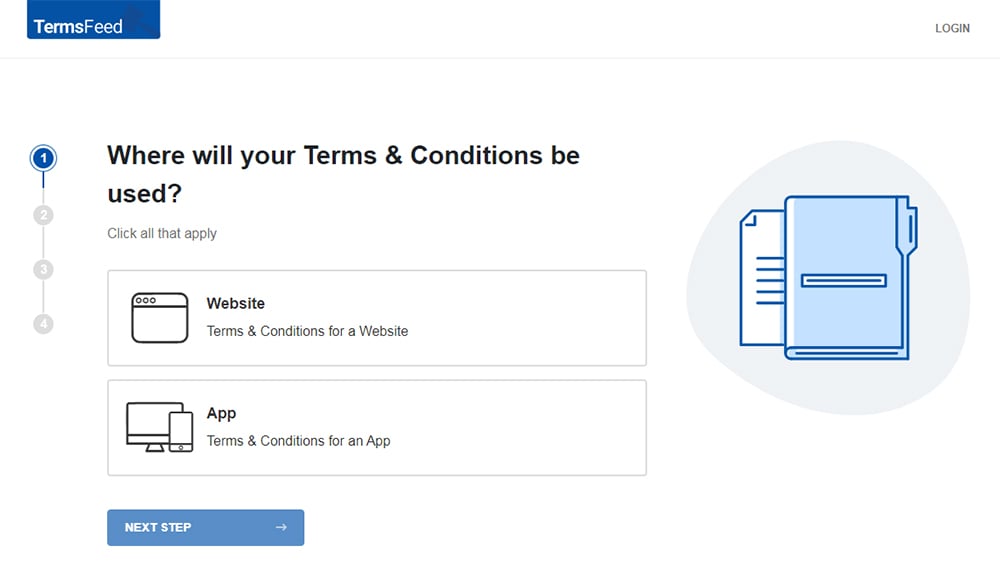
-
Answer some questions about your website or app.
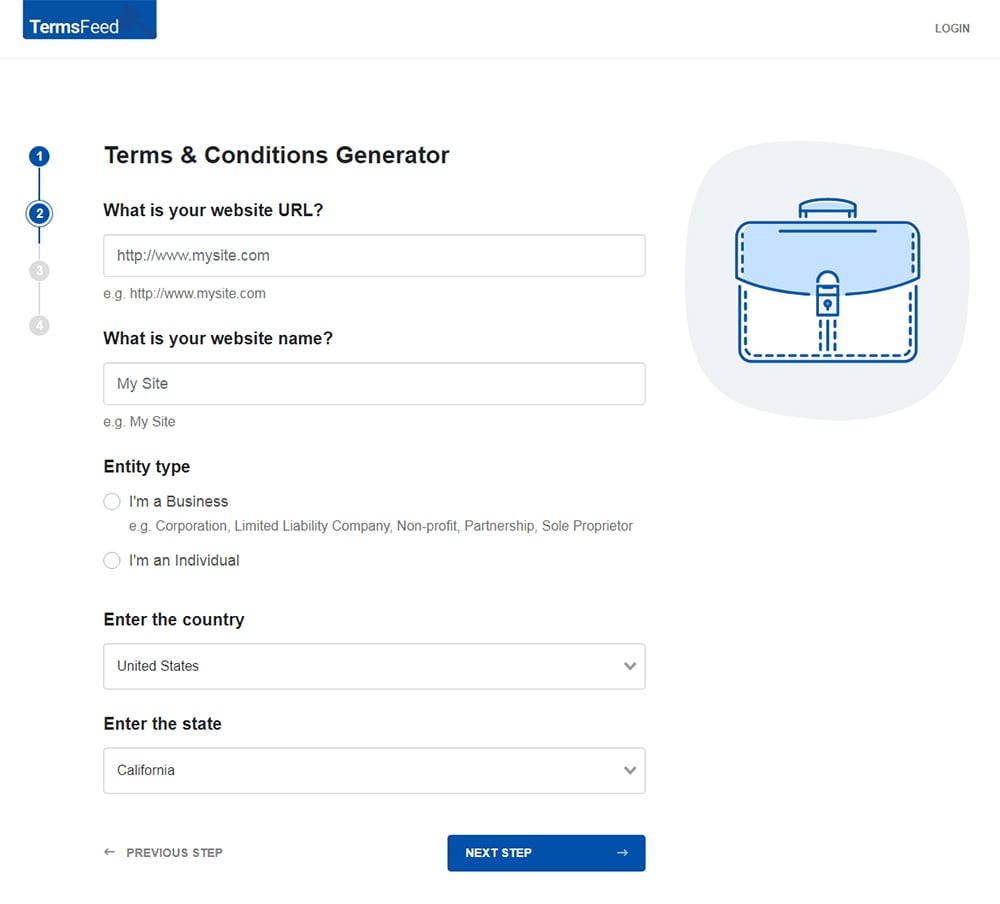
-
Answer some questions about your business.
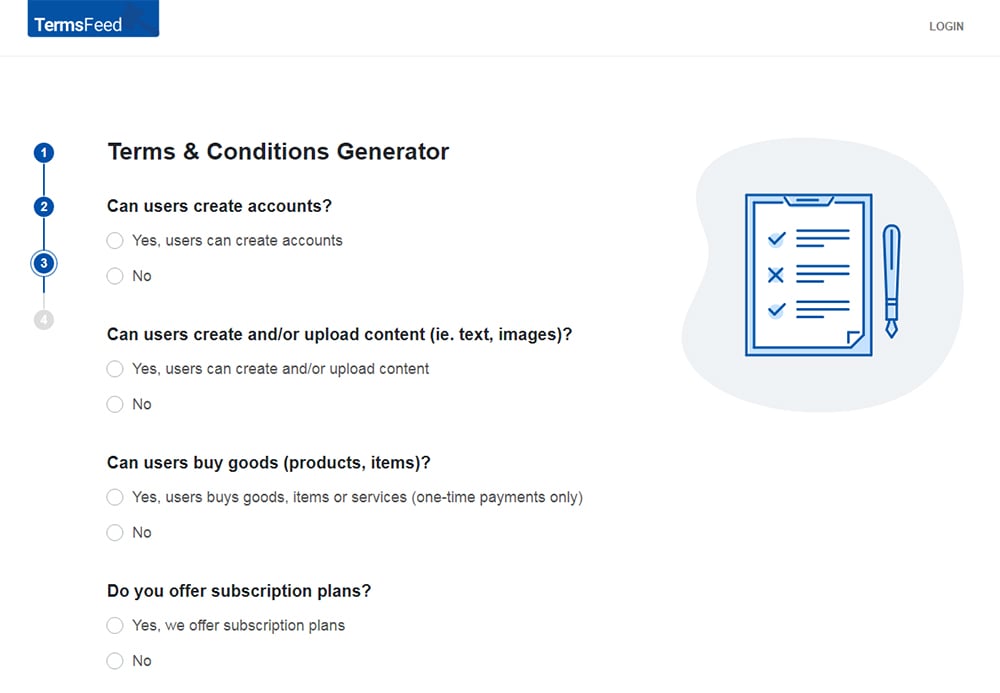
-
Enter the email address where you'd like the T&C delivered and click "Generate."
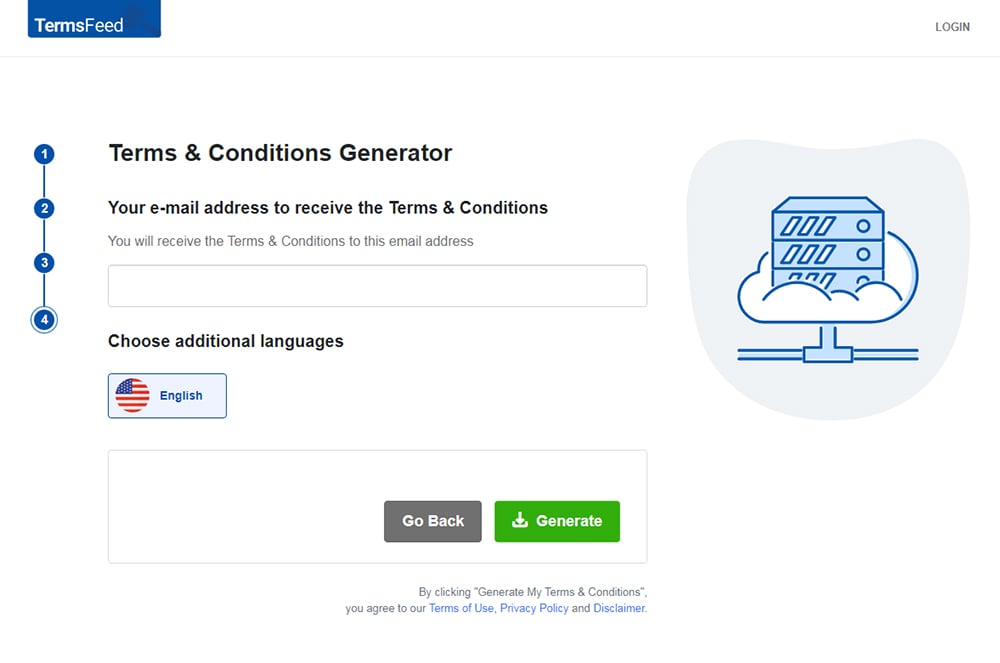
You'll be able to instantly access and download the Terms & Conditions agreement.
- 1. What is a Terms and Conditions Agreement?
- 2. Why Do Membership Websites Need a Terms and Conditions Agreement?
- 3. Should You Copy Terms and Conditions from Another Membership Website's Agreement
- 4. What to Include in a Terms and Conditions Agreement for Memberships
- 4.1. Introduction and Acceptance of the Terms
- 4.2. Governing Law
- 4.3. Your Privacy Practices and Policy
- 4.4. Limitation of Liability and Other Disclaimers
- 4.5. Intellectual Property Rights
- 4.6. Payment Terms
- 4.7. Cancellations and Refunds
- 4.8. User Content and Third-Party Links
- 4.9. Termination
- 4.10. Making Changes to the Terms and Conditions Agreement
- 4.11. Contact Information
- 5. How to Display and Get Agreement to Your Terms and Conditions Agreement
- 6. Summary
What is a Terms and Conditions Agreement?
Terms and Conditions agreement is a contract between you and your members that sets out the rules and regulations for using your website. This agreement should be clear, concise, and easy to understand. It should cover all aspects of the member experience, from signing up for an account to canceling their membership.
With that said, some membership websites separate their membership Terms and Conditions from their general T&C. In essence, they create two documents. However, that's not necessary.
Businesses using a membership model frequently just need one comprehensive Terms and Conditions agreement, and it doesn't even need to mention "membership" in the title.
Why Do Membership Websites Need a Terms and Conditions Agreement?

In contrast with Privacy Policies that are required by laws such as CalOPPA and the GDPR, and others demand, no law or regulation requires you to have a Terms and Conditions agreement for your membership website. However, having one can be beneficial for you and your members in a number of ways.
Most businesses need a T&C because it helps them limit liability if something goes wrong. For example, suppose a visitor sues your company because they claim to have been harmed by your website in some way. In that case, you could point to your Terms and Conditions and argue that the visitor knew the risks and agreed not to hold you responsible.
But what about membership websites? Do they really need a Terms and Conditions agreement?
The answer is yes, for several reasons.
- Clarify payment terms: If you're running a paid membership website, a T&C will allow you to more easily collect membership fees or payments. The T&C will spell out the terms of the payment agreement, including things like how much you'll charge, when payments are due, and what happens if a member doesn't make a payment.
- Limit your legal liability: Even if your membership website is free, you still need a T&C in order to protect yourself from liability. For example, let's say you have a forum on your website where members can post comments and questions.If someone posts something defamatory or otherwise illegal, you could be held liable if you don't have a T&C, which states that members are responsible for their own posts.
- Control your website better: A T&C can help you to manage your website more effectively. For example, you can use the T&C to set out rules for member behavior, such as prohibiting spamming or other abusive behavior.
Should You Copy Terms and Conditions from Another Membership Website's Agreement

You should not copy another company's Terms and Conditions agreement because it may be illegal, and it will lead to you having an inaccurate agreement.
A company instantly acquires copyright when they publish written works online. This covers the text of the Terms and Conditions agreement. While many Terms and Conditions agreements appear to be identical, there are many minute variations between each. Therefore, copying verbatim from a company's Terms and Conditions could be against the company's copyright.
Additionally, since your company is undoubtedly unique from the one you would be copying from, it means that your actual business procedures and preferences would not be adequately mirrored.
Ultimately, you can use a Terms and Conditions template to get the bones of your agreement outlined and ready to go, but it's a best practice to fill in the specifics with information that's unique to your membership website and business.
What to Include in a Terms and Conditions Agreement for Memberships

Not all membership websites have the same clauses in their Terms and Conditions agreements. Each is typically tailored to the needs of the individual business. Still, there are core clauses that most include. We'll provide samples below of each. Let's take a deeper look.
Introduction and Acceptance of the Terms
It's a common practice to use the first few sentences of a Terms and Conditions agreement to specify that by using your website or by becoming a member, the user signifies acceptance of the agreement and the terms within it.
Sites can go one step further and make it clear that anyone who doesn't desire to abide by the T&C should refrain from using the website or becoming a member.
This is how Magnetic Memory Method informs its users about acceptance of its T&C within the agreement's introduction:

Ultimately, you want to convey that using your services constitutes acceptance of the conditions outlined in your agreement. This is the rationale behind the enforceability of your Terms and Conditions.
Governing Law
A governing law clause indicates which laws will govern the agreement in the event of a dispute. Most often, a T&C is governed by the state in which a business is incorporated.
Including a governing law clause could save you time and money in the event of a dispute. Keep in mind that the court may have to determine which laws apply if you don't include a governing law clause. This can be an expensive and time-consuming process.
Here's an example:
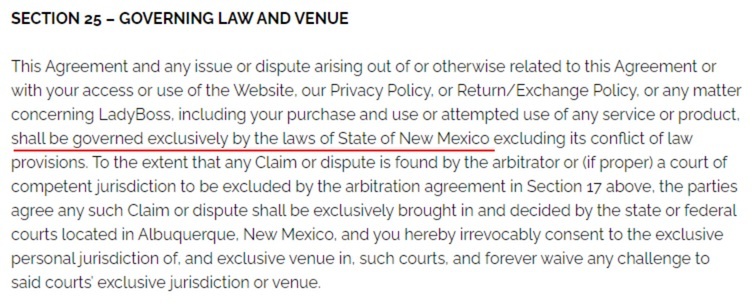
Your Privacy Practices and Policy
Privacy Policies are legally required around the world if you collect any personal data, such as an email address or payment information. To comply with privacy laws, you'll need a Privacy Policy separate from your Terms and Conditions agreement.
With that said, your T&C should still mention privacy, provide some highlights, and then link to the full Privacy Policy document.
Here's an example of this:

Keep the information in this section consistent with your Privacy Policy and make it as clear and simple as possible.
Limitation of Liability and Other Disclaimers
As the owner of a membership website, it's essential to protect yourself from liability in case something goes wrong. That's where a Limitation of Liability and other disclaimers clauses come in.
Without this clause, users may seek compensation for browser crashes, viruses, and other errors associated with your website. Even if you foresee no problems, it's frequently something you never anticipated that lands your business in legal difficulty.
Generally speaking, you want your users to understand that you won't be held liable for losses brought on by their usage of your service. Additionally, you should warn customers that using your membership site may be risky, even if the likelihood of it happening is remote.
The following example clause on this subject is incredibly long and thorough. However, note that it's also one gigantic text block, making it hard for website users and members to read. It could be better.
Writing something comprehensive is okay, but it's a best practice to ensure readability:
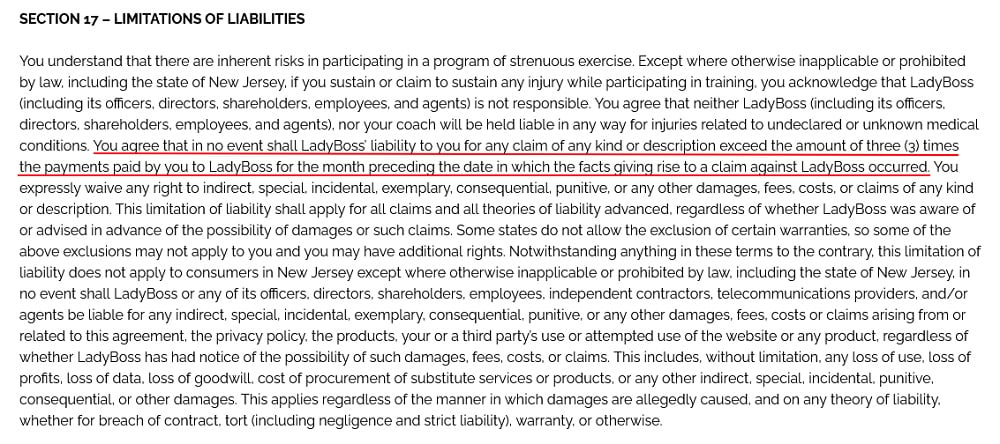
Intellectual Property Rights
Include a statement asserting ownership of your intellectual property and prohibiting unauthorized use.
All visitors to your website will also have access to your intellectual property. This includes any trademarks, copyrighted content, secret formulas, or other features that give your website its individuality.
It is illegal to use someone else's intellectual property without their consent or a license, which is called infringement. If a user does this, you want the option to file a claim for infringement while also blocking that person from using your services.
This circumstance is covered by the intellectual property portion of the Terms and Conditions, as seen in SmartBlogger's Terms and Conditions here:
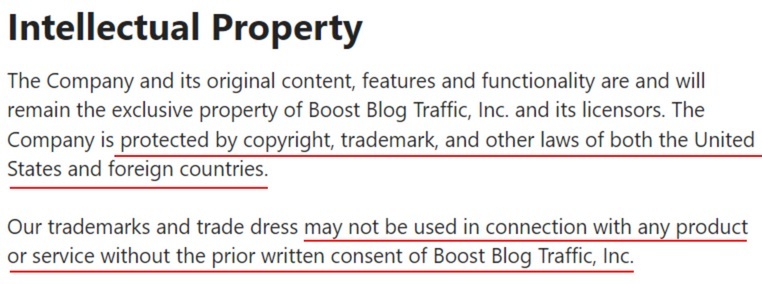
Payment Terms
Payment conditions for subscription services like those used in many membership websites must be stated in their Terms and Conditions.
This gives members advance warning that payment information is needed and enables you to discontinue service for non-payment. These clauses also specify the payment frequency and if you provide quarterly, annual, or monthly payment plans.
You can leave payment amounts out of this area. This information is not required for the Terms and Conditions agreement because you probably already have a page with information on subscription plans and their prices.
The requirement to update your Terms and Conditions agreement if you wish to change your prices or provide a new subscription plan is also removed by doing this.
However, many membership Terms and Conditions explain how and when payment is due, as seen below from SmartBlogger:
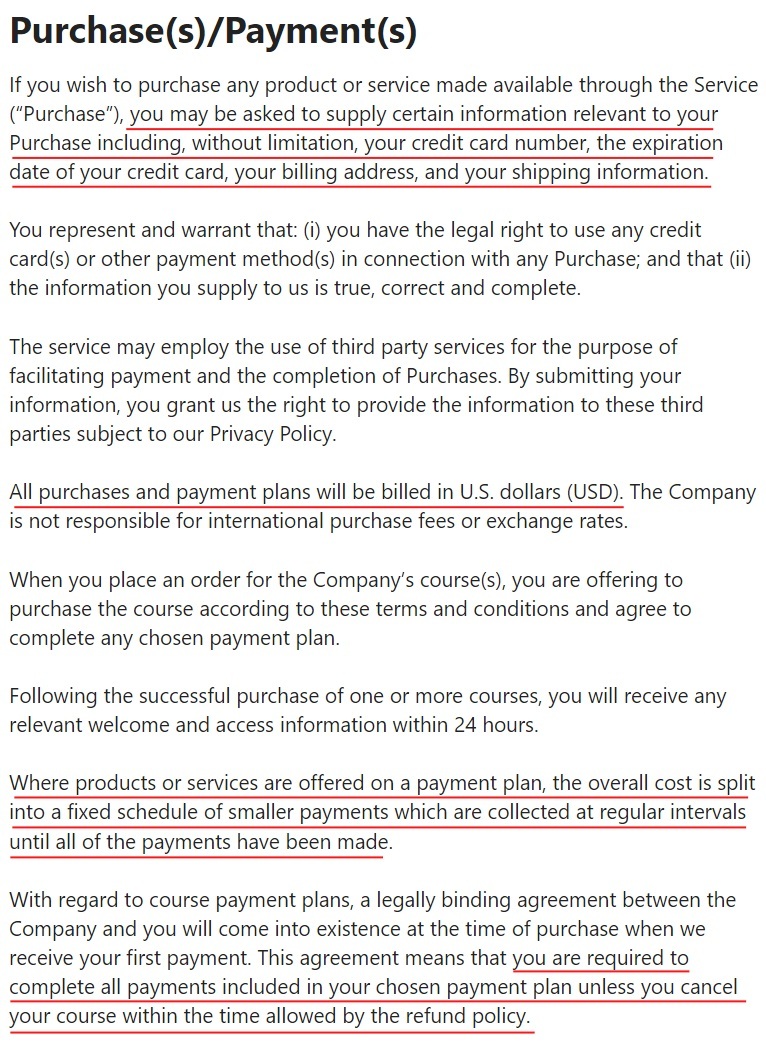
Cancellations and Refunds
Having a clear and concise clause that addresses cancellations and refunds in your Terms and Conditions agreement for a membership website is important. This is because it sets out the expectations for the member regarding what will happen if they decide to cancel their membership.
For example, would they be entitled to a refund of the subscription fee? If so, how long would they have to make the request? If no refund is offered, is that on all products? The membership itself?
If your business differs on refund policies between various services or products that you offer, this is the section where you'll want to make those specifications. Notice that Magnetic Memory Method's clause specifies that members won't receive a refund on the Mastermind subscriptions:
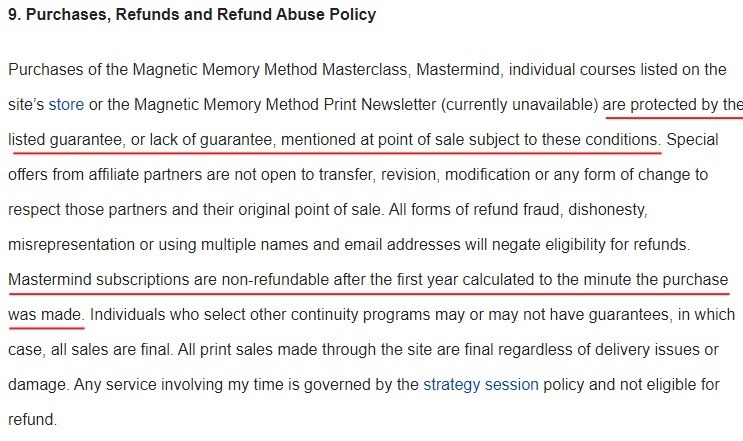
User Content and Third-Party Links
A user content clause protects the website from liability for user-generated content that may be inaccurate, defamatory, or otherwise objectionable.
Many membership websites have forums or other public spaces like comment sections or reviews on which they allow their members to post content.
Likewise, many sites link to third-party services or products not owned or operated by the membership website. This section also protects the website from any liability for the content of those third-party websites.
Notice how SmartBlogger permits user content and has third-party links but specifies the criteria under which both are allowed:
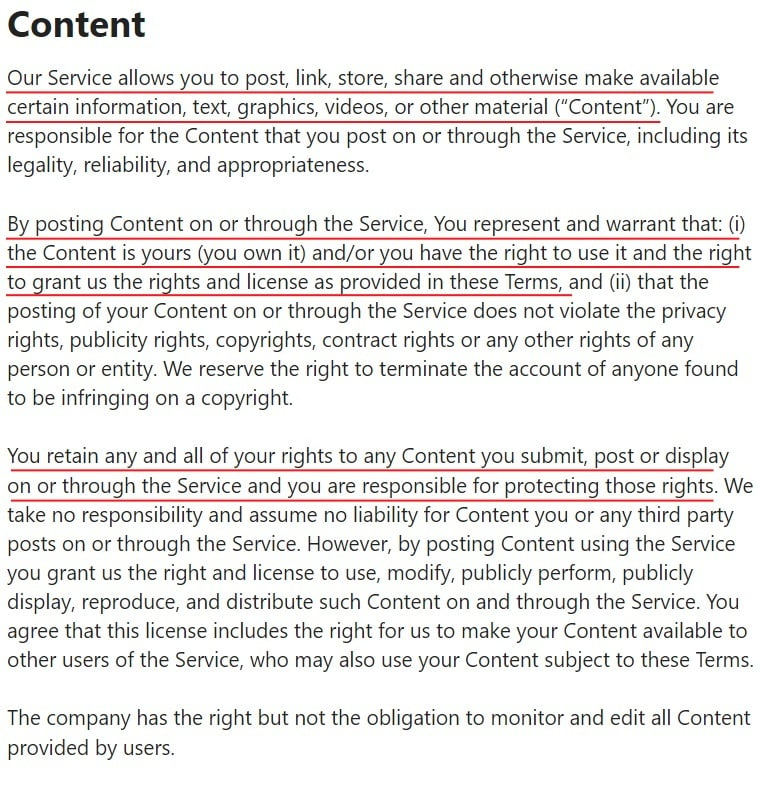
Termination
The power to terminate accounts that break the Terms and Conditions is preserved under the termination clause. Alternatively, you can merely retain the option of closing accounts for any reason you deem proper.
Notice that this clause works to allow the business to maintain the right to terminate membership accounts, even if they're paid in full:
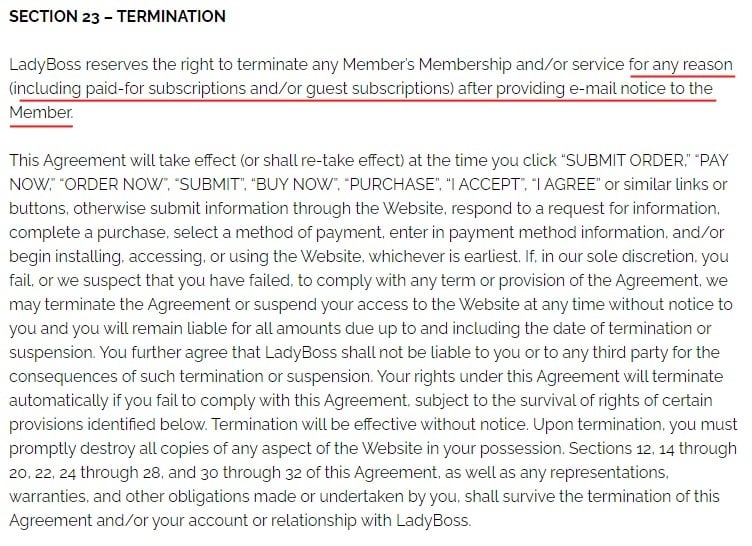
As you can see, that termination clause is detailed and specific. Yours may not need to be that in-depth. If this is your first time writing Terms and Conditions or if your membership site is brand new, a more general termination clause such as SmartBlogger's seen here can be a decent solution in the short term:
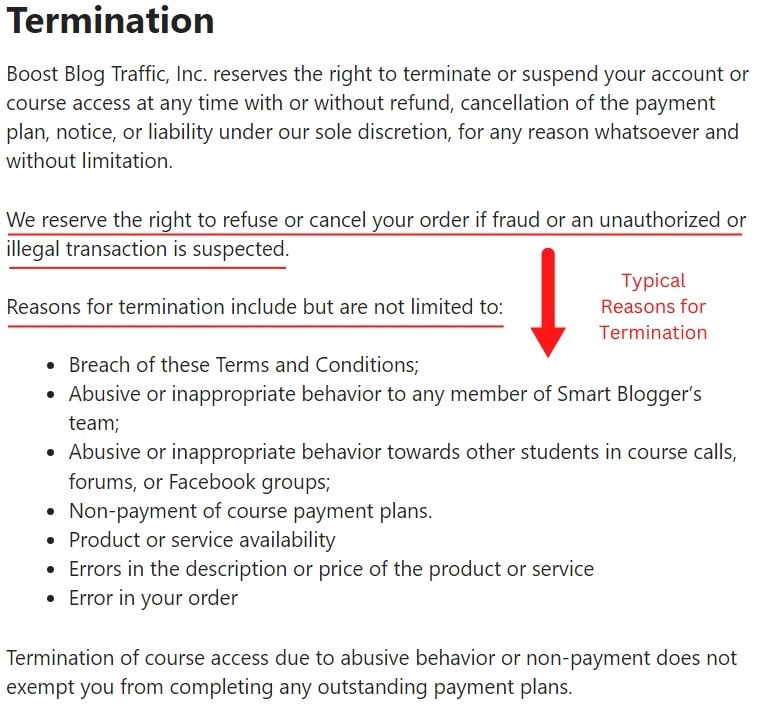
Making Changes to the Terms and Conditions Agreement
As you gain more knowledge about your market and run into new problems, your membership site's Terms and Conditions agreement will evolve. Include language stating this and outline your plan for informing users of any changes.
This information is typically included as one of the last clauses in a Terms and Conditions agreement. Note here that Magnetic Memory Method specifies that it has the right to make changes. Still, it makes no commitment to keeping materials updated, nor does it explain how it will notify users if/when changes are made:
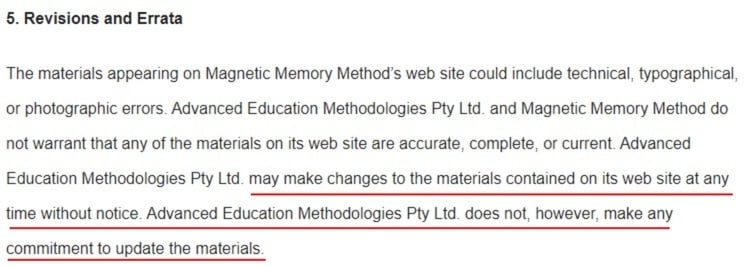
Keep in mind that every Terms and Conditions agreement ought to contain this clause. The absence of it won't likely affect your ability to modify your agreements, but you won't have legal standing if a user sues you over a change.
Contact Information
Your Terms and Conditions should end with an invitation for users to get in touch with you if they have any questions about the provisions of your agreement.
Saying "Have questions? Contact us" and providing an email address or phone number can accomplish this. Notice how simple Succulents and Sunshine's statement is:

After you create your Terms and Conditions agreement, it's time to display it for your members and potential members to review at any time.
How to Display and Get Agreement to Your Terms and Conditions Agreement

You need to display your Terms agreement where users can easily access it. You also need to get consent for users to be legally bound to your terms.
Here's how you can display a Terms and Conditions link in a website footer:
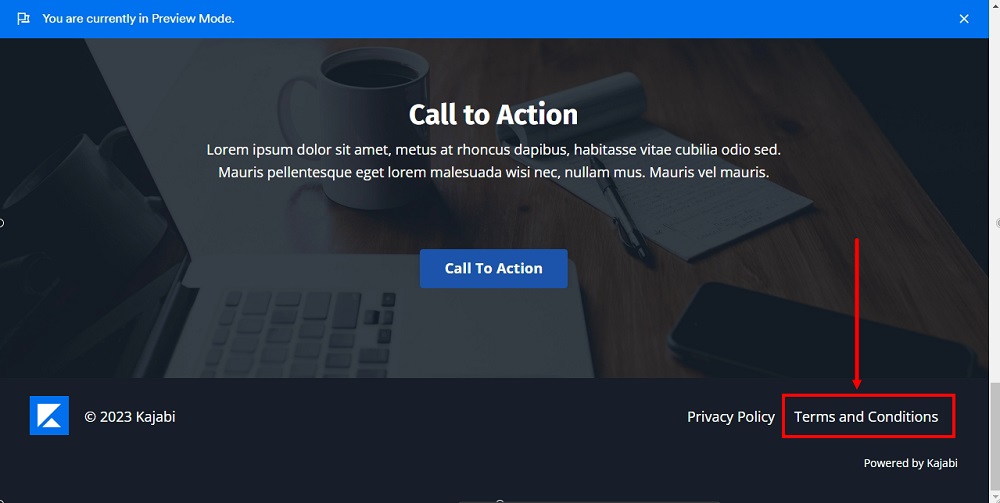
You can (and should) also display a Terms and Conditions link when you allow users to create a contract with you, such as on an account sign-up page, or when an order is submitted.
Here's an example:
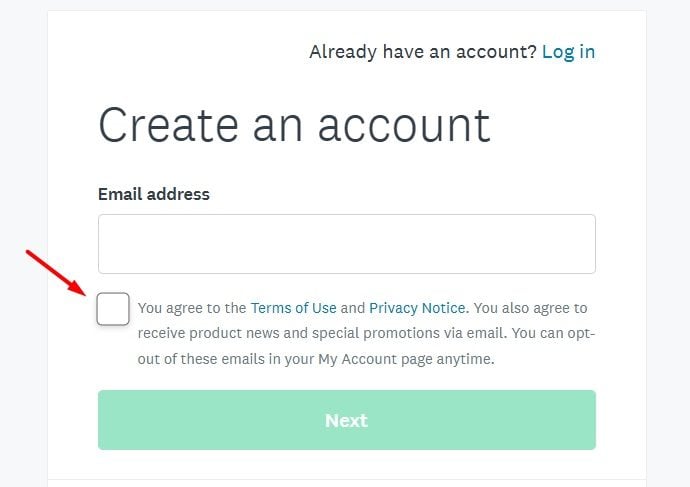
To ensure you obtain consent, many membership sites require users to accept their T&C during account registration, as seen above. You can use an "I Agree" checkbox to do this.
Here's another example of this, at a checkout screen:

Summary
A Terms and Conditions agreement is an essential part of any membership website. By having a Terms and Conditions agreement in place, you can protect your business from legal issues down the road. Not to mention, it helps set clear expectations for both you and your members.
If you don't have a T&C for your membership website yet, now is the time to create one. It could save you a headache (and money) in the long run.
Be sure to get active acceptance of your Terms and Conditions. An "I Agree" checkbox is a way to ensure that your website users actively accept your agreement.
If you want to create a membership Terms and Conditions agreement, remember to incorporate all the same clauses other businesses do. In addition, be sure to include sections on payment terms, cancellations and refunds, user content, third-party links, and additional disclaimers. By doing so, you'll ensure that your Terms and Conditions is thorough and covers all of the bases.
Finally, if you're thinking about starting a membership site or if you already have one, it's essential to make sure that your Terms and Conditions are well-written and tailored to your business.
Don't copy and paste from other sites. Take the time to write your own T&C to reflect your membership's unique value. Doing so will help you avoid legal trouble down the road, and it will also give potential members confidence in signing up for your service.

Comprehensive compliance starts with a Privacy Policy.
Comply with the law with our agreements, policies, and consent banners. Everything is included.
